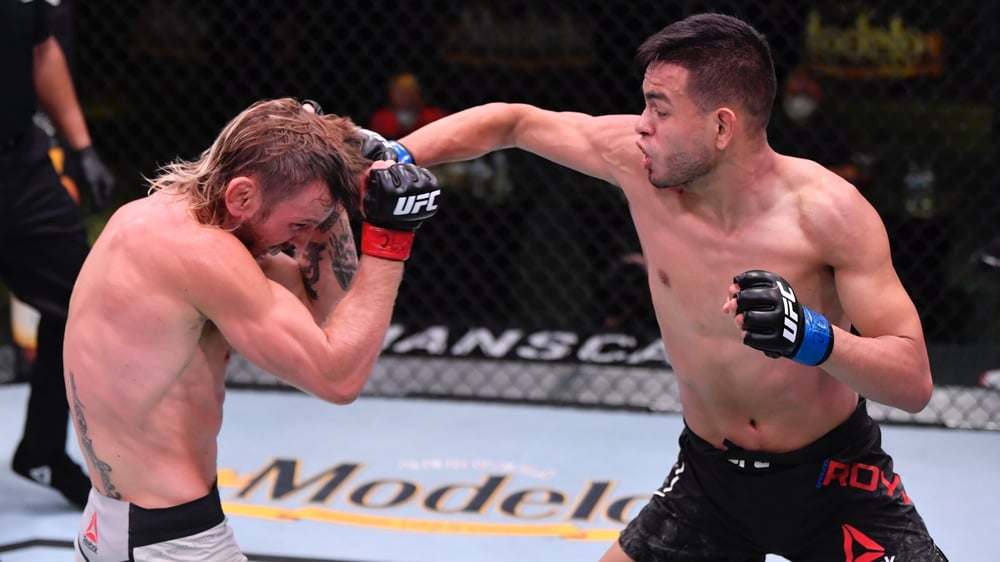
Issue 200
December 2023
Brandon Royval has plenty of inspiration every time he sets foot in the Octagon, thanks to his experience working as a youth corrections officer prior to turning full-time as a fighter. Emma Bramford caught up with the fighter known as “Raw Dawg” to find out more.
Born and raised in Denver, Colorado, Royval started training jiu-jitsu and Muay Thai at the age of 15. He would cycle to training every day and work under head coach Marc Montoya, who would later own his gym, Factory X Muay Thai in Englewood, where Royval would find his new permanent home and cycle there every day.
Royval had his first amateur bout at 18, and went 5-0 as an amateur before turning professional at 20. Competing mainly on the regional circuit, predominantly for Legacy Fighting Alliance (LFA), Royval compiled a 9-4 record before competing for the vacant LFA flyweight title against Nate Williams. Royval won the fight, and the title, in just 23 seconds via armbar submission. That title win opened the door to the big stage, and it wasn’t long before he was signed to the UFC.

While Royval was still competing and winning bouts and titles, he also worked full-time at a youth correctional facility in Denver, where he saw his true calling.
"I worked with the juvenile youths for years, and it was amazing,” he explained.
“I was working there up until my second fight in the UFC.
“Over these last few years, I've had an excellent opportunity to give back to the community. Working at 'the juvy' is the basis of my desire to give back to my community. You see a lot of kids with not a fair shake at life. I wouldn't say wasted potential, but you see so much potential in that correctional facility. Potential things are untapped, and people are born in unfair circumstances.
“They say America has equal opportunities and a chance to get rich, but people do not start from the same point. The starting line for everyone is different, and some of these kids are starting so far behind. And, for a lot of people, the circumstances and opportunities that are being presented to them are just a vision of what could be, and are very limiting.”
You could hear the passion in Royval's voice as he explained his role in the juvenile center and what it meant to him.
"I feel like being in a community, those people are super important to me,” he continued.
“I feel like just inspiring hope and doing whatever I can. As I said, working in 'the juvy' was a cool job, and you take a lot home with you. I feel like the majority of kids I worked with either went straight back to jail or were shot and killed, or even overdosed.
“The good stories are few and far between. There a handful of kids that did good, but I mainly see a lot of my kids on the news, and that's the saddest thing about that part of it.”
Hoping he can still make a difference with the youths he connected with whilst working that job, Royval explained, “I do see a lot of them. There was a barber program, so I’d get my hair cut by them to see how they are doing, and I will also reach out to them via my social media.”

After Royval's second appearance for the UFC, he quit his full-time job and took on a coaching role at the gym where he trains full-time, so his time is fully committed to getting the best outcome possible while competing in the Octagon.
Royval's first two UFC bouts produced victories, but his next two bouts saw his momentum hit the buffers. Against Brandon Moreno, he suffered a shoulder injury that took him out of action for nine months. Then he faced Alexandre Pantoja and lost via rear-naked choke in the second round.
After suffering back-to-back losses for the first time in his career, Royval went back to the drawing board, then returned to form with three straight victories. A split-decision win over Rogerio Bontorin was followed by a pair of first-round finishes, against Matt Schnell and Matheus Nicolau, as Royval earned himself a shot at the flyweight title, and a rematch with former nemesis Pantoja, at UFC 296.
It’s Royval’s first shot at UFC gold, and the man dubbed “Raw Dawg” – for never playing it safe inside the cage – has admitted that he’ll be more controlled in the rematch.
"I feel the preparation for Panjota has been in the works for about six months anyways,” he said.
“I won't be surprised, but with that being said, he does super well. So I'm just going to weather the storm as he will come out guns blazing, and I want to be prepared for that second round, coming at me full speed.
“I feel this fight will be a little bit of the same but just a lot more controlled chaos from me. You will see a more controlled and methodical approach this time, a lot more of a chess match coming from me, (and) possibly him.”
That won’t mean a change in his nickname, though, as he explained.
"I went and used it for one fight, and I ended up knocking the dude out,” he grinned.
“From there on out, I've been superstitious of it, and I could never get rid of the nickname after. It just stuck!”
...









